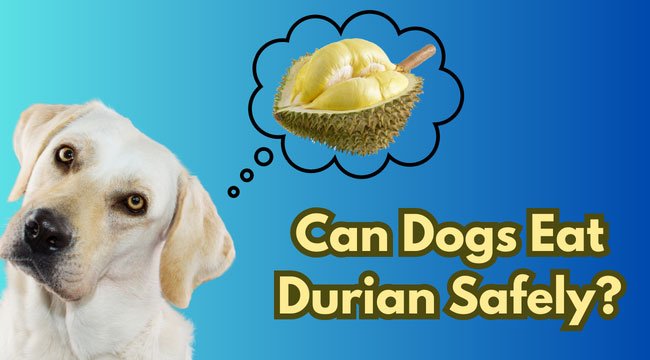Can Dogs Enjoy Durian? Nutritional Info and Safety Tips

Welcome to the fascinating world of durian, a fruit that stands out with its unmistakable features and rich cultural heritage. Encased in a spiky exterior that contrasts with its smooth, creamy flesh, durian is renowned for its powerful aroma, often described as a blend of sweet almonds and pungent onions.
Originating from tropical regions of Southeast Asia, particularly in countries like Thailand, Malaysia, and Indonesia, durian holds a prestigious status as the “king of fruits.” It has been cherished for centuries, valued not only for its exotic flavor but also for its versatility in culinary applications. In Southeast Asian cuisine, durian is enjoyed fresh or incorporated into a wide range of dishes, desserts, and beverages, reflecting its deep integration into local culinary traditions.
Nutritionally, durian offers a robust profile of essential nutrients. It is particularly rich in vitamins, especially vitamin C, which supports immune function and overall health. Durian also provides a variety of minerals such as potassium, manganese, and copper, essential for various bodily functions. Its dietary fiber content promotes digestive health, although its high natural sugar content requires moderation in consumption.
As you explore the complexities of durian, you’ll discover not only its sensory appeal and cultural significance but also its nutritional benefits that continue to captivate and inspire culinary enthusiasts worldwide.So join us as we will explore whether- can dogs eat durian or not.
Nutritional Benefits of Durian for Dogs
Durian, known for its unique taste and aroma, offers several nutritional benefits that can potentially support a dog’s health when consumed in moderation. Here’s a detailed look at the specific nutritional benefits of durian for dogs:
- Vitamin C: Boosts immune system function
Explanation:
- Durian contains vitamin C, an essential nutrient that supports the immune system in dogs.
- Vitamin C helps stimulate the production of white blood cells, which are crucial for fighting off infections and illnesses.
Benefits:
- Enhances the dog’s ability to resist infections and recover faster from illnesses.
- Supports overall immune system health, particularly during times of stress or illness.
- B-Complex Vitamins: Supports energy metabolism and overall vitality
Explanation:
- Durian provides various B-complex vitamins, including B1 (thiamine), B2 (riboflavin), B3 (niacin), B5 (pantothenic acid), B6 (pyridoxine), and B9 (folate).
- These vitamins play essential roles in energy production, maintaining healthy skin and coat, and supporting neurological functions.
Benefits:
- Supports the dog’s metabolism by converting food into energy more efficiently.
- Promotes overall vitality, helping to maintain optimal health and activity levels.
- Dietary Fiber: Aids digestion and promotes gut health
Explanation:
- Durian contains dietary fiber, which is important for digestive health in dogs.
- Dietary fiber includes both soluble and insoluble types that help regulate bowel movements and promote a healthy digestive tract.
Benefits:
- Prevents constipation and diarrhea by promoting regular bowel movements.
- Supports the growth of beneficial gut bacteria, which contributes to overall gut health and immune function.
- Antioxidants: Help combat oxidative stress and inflammation
Explanation:
- Durian is rich in antioxidants such as vitamin E, vitamin A (beta-carotene), and flavonoids.
- Antioxidants protect cells from damage caused by free radicals and reduce inflammation in the body.
Benefits:
- Helps neutralize harmful free radicals, reducing oxidative stress and cellular damage.
- Supports joint health by reducing inflammation, which can be beneficial for dogs with arthritis or joint issues.
Durian can offer dogs several nutritional benefits, including vitamin C for immune support, B-complex vitamins for energy metabolism and vitality, dietary fiber for digestive health, and antioxidants for combating oxidative stress and inflammation. These nutrients contribute to overall health and well-being when integrated into a balanced and appropriate diet. However, it’s important to consider the high fat and sugar content in durian, which may pose risks such as pancreatitis, obesity, and dental issues if consumed excessively. Pet owners should always introduce durian gradually, monitor for any adverse reactions, and consult with a veterinarian before incorporating it into their dog’s diet. By providing durian in moderation and alongside safer fruit alternatives, pet owners can enhance their dog’s nutrition while minimizing potential health risks.
Can Dogs Safely Enjoy Durian?
Durian, known for its rich flavor and creamy texture, presents both potential benefits and risks for dogs. Here’s a balanced perspective on whether dogs can safely enjoy durian:
- Moderation: Small amounts occasionally may be safe for some dogs
Explanation:
- Offering durian in small quantities and infrequently may not pose immediate harm to some dogs.
- Moderation is key to avoid potential health issues associated with durian’s high fat and sugar content.
Benefits of Moderation:
- Allows dogs to experience the unique flavor and potential nutritional benefits of durian without overloading their system.
- Reduces the risk of digestive upset or other adverse reactions.
- Considerations: Potential risks include high fat, sugar, and toxic parts (seeds and rind)
Explanation:
- High Fat Content: Durian contains significant amounts of fat, which can contribute to obesity and increase the risk of pancreatitis in dogs.
- High Sugar Content: Excessive sugar intake from durian can lead to weight gain, diabetes, and dental issues.
- Toxic Parts: The seeds and tough rind of durian pose choking hazards and can cause intestinal blockages if ingested.
Precautions:
- Remove all seeds and peel the rind completely before offering durian to your dog.
- Monitor closely for any signs of digestive distress or other adverse reactions after consumption.
- Individual Tolerance: Some dogs may have allergies or sensitivities to durian
Explanation:
- Like any new food, durian may trigger allergies or sensitivities in some dogs.
- Symptoms of allergic reactions can include itching, hives, swelling, or difficulty breathing.
Cautionary Approach:
- Introduce durian gradually and observe your dog closely for any signs of allergic reactions or sensitivities.
- If your dog shows any adverse reactions, discontinue feeding durian and consult with your veterinarian.
While durian can potentially offer dogs a unique taste experience and some nutritional benefits, it should be approached with caution. Moderation is essential to minimize the risks associated with durian’s high fat and sugar content, as well as the potential hazards of its seeds and rind. Considering individual tolerance and monitoring for any adverse reactions are crucial steps in determining whether durian can be safely included in your dog’s diet. Consulting with a veterinarian before introducing durian or any new food can provide personalized guidance based on your dog’s health needs and help ensure their safety and well-being. By making informed decisions and prioritizing your dog’s health, you can better navigate the suitability of durian as a treat for your furry companion.
Risks and Potential Hazards of Durian for Dogs
Durian, while potentially offering some nutritional benefits, poses several risks and hazards that dog owners should consider carefully before feeding it to their pets.
- High Fat Content: Risk of pancreatitis and obesity
Explanation:
- Durian is high in fat, which can increase the risk of pancreatitis in dogs.
- Pancreatitis is a painful inflammation of the pancreas that can be triggered by high-fat foods.
Implications:
- Feeding durian regularly or in large quantities can lead to weight gain and obesity in dogs.
- Dogs with a history of pancreatitis or those prone to digestive issues should avoid high-fat foods like durian.
- Toxic Parts (Seeds and Rind): Pose choking or intestinal blockage hazards
Explanation:
- Durian seeds are large and hard, posing a choking hazard if swallowed whole.
- The tough rind of durian is indigestible and can cause intestinal blockages if ingested.
Precautions:
- Always remove seeds completely and discard the rind before feeding durian to your dog.
- Monitor closely to ensure no accidental ingestion of these hazardous parts.
- High Sugar Content: Can contribute to obesity, diabetes, and dental issues
Explanation:
- Durian contains natural sugars that, when consumed excessively, can contribute to weight gain and obesity in dogs.
- Excessive sugar intake may also lead to insulin resistance and increase the risk of diabetes mellitus.
- Sugars in durian can promote dental plaque formation, potentially leading to dental issues like cavities.
Management:
- Feed durian in moderation and monitor your dog’s overall sugar intake from all sources.
- Consider the potential impact on weight management and dental health when offering durian as a treat.
While durian offers potential nutritional benefits such as vitamins and antioxidants, its high fat and sugar content, along with the hazards posed by its seeds and rind, make it a risky choice for dogs. Pet owners should exercise caution and consider safer alternatives with fewer risks, such as apples, blueberries, and bananas, to ensure their dog’s health and well-being. Consulting with a veterinarian before introducing durian or any new food into your dog’s diet is crucial for personalized advice and guidance based on your dog’s individual needs and health conditions. By prioritizing safety and making informed choices, you can help ensure that your dog receives a balanced and healthy diet.
Safety Tips for Feeding Durian to Your Dog
Durian can be a unique treat for dogs, but it’s important to follow these safety tips to ensure their well-being when offering this fruit.
- Preparation: Remove seeds and rind completely before offering
Explanation:
- Durian seeds are large and hard, posing a choking hazard if swallowed whole.
- The tough rind is indigestible and can cause intestinal blockages.
Steps:
- Thoroughly remove all seeds from the durian flesh.
- Peel off and discard the rind completely to prevent accidental ingestion.
- Start Small: Introduce small pieces to test tolerance
Explanation:
- Some dogs may not be accustomed to durian or may have sensitivities to new foods.
- Introducing small amounts allows you to gauge how well your dog tolerates durian.
Approach:
- Begin with a small piece of durian and observe your dog’s reaction.
- Monitor closely for any signs of digestive upset, allergic reactions, or behavioral changes.
- Monitor Closely: Watch for any signs of adverse reactions after consumption
Explanation:
- Dogs may exhibit adverse reactions to new foods, including durian.
- Symptoms may include vomiting, diarrhea, abdominal discomfort, itching, swelling, or changes in behavior.
Observation:
- Keep an eye on your dog after feeding durian.
- Note any unusual symptoms and be prepared to take action if necessary.
- Consultation: Always consult with your veterinarian before feeding durian to your dog
Explanation:
- Your veterinarian can provide personalized advice based on your dog’s health history and dietary needs.
- They can offer guidance on whether durian is suitable for your dog and recommend appropriate portion sizes.
Benefits:
- Ensure durian fits into your dog’s overall diet without compromising their health.
- Receive recommendations on alternative treats or fruits if durian is not suitable for your dog.
Following these safety tips can help you responsibly introduce durian as a treat for your dog. By preparing durian properly, starting with small portions, closely monitoring for any adverse reactions, and consulting with your veterinarian, you can ensure your dog’s safety and enjoyment. Always prioritize your dog’s health and well-being when selecting treats or new foods to incorporate into their diet.
Alternative Fruits for Dogs
- Apples (seedless): Rich in fiber and vitamins
Nutritional Benefits:
- Provides dietary fiber, which promotes digestive health and regulates bowel movements.
- Contains vitamins such as vitamin A and vitamin C, which support overall health.
- Blueberries: Packed with antioxidants and low in calories
Benefits:
- Rich in antioxidants such as vitamin C, vitamin K, and various phytochemicals that help combat oxidative stress.
- Low in calories, making them a healthy treat option for dogs without contributing to weight gain.
- Bananas: Good source of potassium and easily digestible
Other Benefits:
- Contains potassium, which supports heart health and muscle function in dogs.
- Easily digestible, making it gentle on the digestive system and suitable for dogs with sensitive stomachs.
- Strawberries: High in vitamin C and fiber
Nutritional Benefits:
- High in vitamin C, which boosts the immune system and supports skin health in dogs.
- Provides dietary fiber, aiding in digestion and promoting gut health.
- Watermelon (seedless): Hydrating and low in calories
- High water content helps keep dogs hydrated, especially during hot weather.
- Low in calories and fat, making it a refreshing and guilt-free treat option.
Considerations
When offering fruits to your dog, remember to:
- Remove seeds and pits: Seeds and pits from fruits like apples and watermelon can be choking hazards or cause intestinal blockages.
- Feed in moderation: While these fruits are generally safe, moderation is key to prevent digestive upset or excess calorie intake.
- Monitor for allergies: Some dogs may have allergies or sensitivities to certain fruits, so introduce new fruits gradually and observe for any adverse reactions.
Incorporating these fruits into your dog’s diet can provide nutritional benefits and variety while ensuring their overall health and well-being. Always consult with your veterinarian if you have any concerns or questions about your dog’s diet or specific fruit choices.



